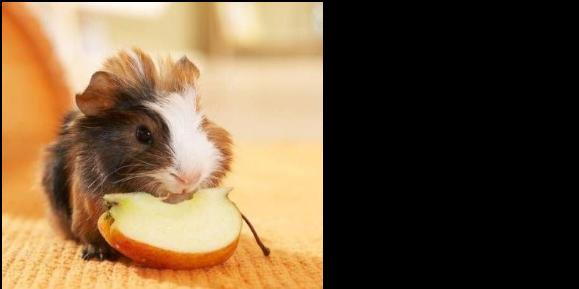
Importance of Rabbit & Guinea Pig Diet
Rabbits and guinea pigs are unique in many anatomical ways, with their teeth and gastrointestinal tract being the two main areas of importance. Feeding the correct diet to these small mammal species is essential to having a happy, healthy pet. The majority (80%) of their diet should be orchard grass hay, like timothy hay. And the other 20% of their diet should be fresh, chopped vegetables like zucchini, squash, bell pepper, etc.
Rabbit and guinea pig owners should feed unlimited high-fiber foods. Grass, good-quality timothy hay, and fibrous, green, leafy vegetables are a favorable food that is high in fiber and encourage the grinding motions of the jaw that benefit attrition of the teeth. Pellets are not a necessary part of a rabbit or guinea pig’s diet. If pellets are fed, they should be timothy hay-based, not alfalfa based. Pellets require a less desirable chewing motion of the jaw, not the grinding motion required for fibrous grasses and hays. Without the grinding motion of eating hay, the teeth of rabbits and guinea pigs will overgrow and cause painful malocclusions.
Signs of dental disease may include:
1) Changes in eating ability and/or pattern (decreased food intake, picky eating, and dropping food from the mouth)
2) Changes in fecal output, size, and appearance
3) Drooling and/or matting of hair on the forelimbs
4) Nasal discharge
5) Bulging of the eye(s) or face
6) Teeth grinding
If any of these signs are seen, your pet should be seen by an exotic veterinarian for an assessment of diet as well as a thorough physical exam.
The diet is also extremely important to maintain a good running gastrointestinal tract. Rabbits and guinea pigs are hindgut fermenters, meaning they digest fiber in their lower intestines, and they should constantly be eating and defecating. Like those of most herbivores (think cows, horses, goats), the stomach and intestines of a rabbit should never be empty. A diet consisting of good hay and fibrous vegetables keeps the GI tract full and constantly moving. Without this high fiber diet, a deadly condition in which the digestive system slows down or stops completely can occur. This is called GI (gut) stasis or ileus. Bad bacteria then builds up in the intestines and releases gas into the system, causing very painful bloating and further decreasing their motivation to eat or drink. If a rabbit or guinea pig go even 6 hours without eating or defecating, this is a medical emergency! To reduce the risk of your pet developing GI stasis, an appropriate diet is key to prevention.

